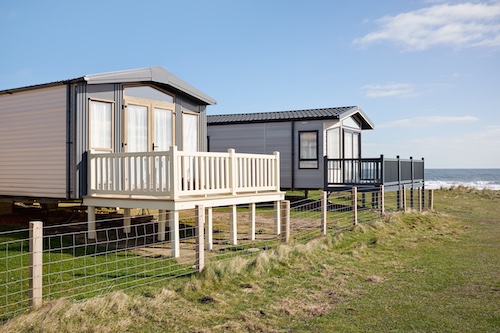Can you get a VA loan for a mobile or manufactured home?
Contributed by Karen Idelson
Aug 12, 2025
•5-minute read

As of November 16, 2025, both Fannie Mae and Freddie Mac no longer have a minimum credit score threshold in their conventional loan eligibility guidelines. Loan approval will instead be based on an evaluation of overall credit risk factors.
VA loans are mortgages that are offered to servicemembers, veterans, and their surviving spouses and backed by the U.S. Department of Veterans Affairs. Because these loans are guaranteed by the government, they do not require a down payment or mortgage insurance. However, you can only use a VA loan to buy certain property types.
As homes get more expensive, more buyers are turning to the option of buying a manufactured home. Here, we’ll get into what exactly a manufactured home is and how you can use a VA loan to purchase one.
Can you use a VA loan to buy a mobile or manufactured home?
Yes, you can use a VA loan to finance the purchase of a manufactured home if you and the property meet the eligibility requirements set by the VA.
Manufactured homes can be an option for those who’ve been priced out of other types of homes. VA loans are designed to help those who have served in our Armed Forces to achieve homeownership affordably. Not only is there no down payment requirement, but you also don’t have to purchase mortgage insurance, which can help keep your monthly payments affordable. VA loans are also the only loan that can be used to convert up to 100% of your home value into cash.
While it is possible to get a VA loan for a manufactured home, you can’t get a VA loan to buy a mobile home. Sometimes these terms get used interchangeably, but there’s a key difference that will impact the property’s eligibility.
How do mobile and manufactured homes differ?
Legally, a home that was manufactured before June 15, 1976, is classified as a mobile home. Homes built after that date had to comply with federal building and safety standards that are enforced by the U.S. Department of Housing and Urban Development.
Because mobile homes do not meet these standards, lenders consider them to be higher risk to finance. As a result, you cannot use a VA loan to buy a mobile home built before 1976. Because manufactured homes are built to adhere to HUD’s construction codes, you can use a VA loan to buy one. You’ll just need to make sure you meet all the eligibility criteria.
Requirements to get a VA home loan for a manufactured home
To get a VA loan, you’ll have to meet the eligibility requirements set by both the VA and your lender. While each lender has their specific criteria, here are some of the minimum standards set by the VA.
Property requirements
Here are some of the requirements that the manufactured home itself must meet to be purchased with a VA loan:
- The home must be affixed to a permanent foundation.
- It must be classified as real property titled with the land.
- The property has to have a HUD tag that certifies that it’s been inspected and meets the construction standards for manufactured homes.
- The home must meet VA minimum property requirements regarding sanitation, safety, and structural integrity.
- A single-wide home must have at least 400 square feet of living space. A double-wide home must have a minimum of 700 square feet of floor space.
Borrower requirements
The VA also requires that borrowers meet the following qualifications:
- Certificate of Eligibility: A Certificate of Eligibility (COE) certifies that you’re eligible to get a VA loan based on your service time. Current servicemembers must have served for at least 90 consecutive days to be eligible.
- Credit score: The VA doesn’t impose a minimum credit requirement, but many lenders require a credit score of at least 620.
- Debt-to-income ratio (DTI): DTI reflects the amount of your monthly income that goes toward debt payments. The VA requires that your minimum monthly debt payments take up no more than 41% of your gross monthly income.
- VA funding fee: Borrowers have to pay a one-time VA funding fee that’s between 1.25% - 3.3% of the loan amount depending on your down payment.
- Down payment: Most lenders will require around 5% of the purchase price of the manufactured home as a down payment, thought this may vary depending on the individual borrower.
Benefits of using a VA loan for a manufactured home
Here are some of the advantages of buying a manufactured home with a VA loan:
- Competitive interest rates: VA loans come with interest rates that are often lower than other loan types, which can result in significant savings over time.
- No prescribed loan limits: Unlike conventional and FHA loans, there’s no set loan limit for VA loans. You can get a loan for up to the appraised value.
- Can be used to purchase both the home and land: You can use one VA loan to purchase both the manufactured home and the property it sits on.
- Lower up-front investment: Eligible borrowers may be able to secure a low down payment or avoid a down payment, depending on their personal financial situation.
Other financing options for mobile and manufactured homes
Not all lenders offer VA loans for mobile homes. You’ll have a wider range of financing options for manufactured homes built after June 15, 1976. Here are some options to think about:
- Chattel loan: Chattel loans are loans specifically used for manufactured homes or other moveable personal property. Rocket Mortgage® does not currently offer chattel mortgage loans.
- Conventional loan: A conventional loan is the most commonly used loan type. To get a primary property, you need 3% down and a 620 credit score.
- Personal loan: Personal loans are unsecured, which means there’s no collateral to back them up. As a result, they come with higher interest rates, but it’s a fairly quick qualification process.
- FHA loan: FHA loans are backed by the Federal Housing Administration and, as a result, they have looser credit score requirements.
FAQ
Here are the answers to some frequently asked questions about buying a manufactured home with a VA loan.
Do all lenders offer VA loans for mobile homes or manufactured homes?
Some lenders don’t offer VA loans on manufactured homes. If it’s affixed to a permanent foundation, Rocket Mortgage® offers VA loans for manufactured homes.
Can I get a VA loan for a manufactured home that’s been moved?
Most lenders won’t finance a manufactured home that’s been moved. Moving it would mean it wasn’t attached to a permanent foundation, and this would require a special approval from the VA.
Can I do a VA cash-out refinance for a manufactured home?
You can do a VA cash-out refinance on a manufactured home. This is commonly used to refinance an existing loan and purchase the lot on which the home sits.
Why can’t I finance a mobile home with a VA loan?
Mobile homes were built before June 15, 1976, when national safety standards enforced by HUD went into effect. For this reason, lenders consider the investment to be too risky to finance a traditional mortgage based on that collateral. You would have to use a chattel loan or an unsecured personal loan.
The bottom line: You have options
A VA loan can be used to finance a manufactured home that was built on or after June 15, 1976. You won’t be able to use a VA loan to finance a mobile home built before that date. The manufactured home will also need to be attached to a permanent foundation titled with the land. There are advantages to using a VA loan for a manufactured home, including that they typically don’t require a down payment and have very competitive rates.
If it’s on a permanent foundation, Rocket Mortgage offers VA loans for manufactured homes. If you’re ready to begin, start your mortgage application online today.

Rory Arnold
Rory Arnold is a Los Angeles-based writer who has contributed to a variety of publications, including Quicken Loans, LowerMyBills, Ranker, Earth.com and JerseyDigs. He has also been quoted in The Atlantic. Rory received his Bachelor of Science in Media, Culture and Communication from New York University.
Related resources

8-minute read
VA loan entitlement: Everything you need to know
VA loan entitlement is the amount of money the VA will pay if a VA loan borrower defaults on their mortgage. Learn about VA loan entitlement and how it works.
Read more

7-minute read
What is a VA loan foreclosure and how can you prevent it?
If you’ve fallen behind on your VA loan payments, you may be worried about foreclosure. Learn about your options and how to avoid foreclosure.
Read more

9-minute read
A guide to the VA loan preapproval process
A VA loan preapproval gives eligible borrowers an advantage when buying a home. Loan more about the VA loan preapproval process.
Read more